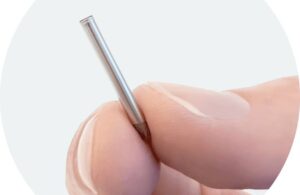
Alameda, California-based Vivani has its miniature, twice-yearly exenatide implant — NPM-115 — under development to treat chronic weight management. The company also disclosed that it included semaglutide as the active pharmaceutical ingredient in its NPM-139 subdermal GLP-1 implant for chronic weight management. That implant has the benefit of once-yearly administration.
According to a news release, these developments highlight the company’s strategic shift to prioritize obesity implants. The company said it based this change on emerging data regarding the potential for high-dose GLP-1 products.
Vivani develops NanoPortal implant technology to steadily deliver medication over extended periods of time. The company aims to guarantee correct doses for patients while avoiding potential safety concerns around fluctuating drug release profiles. The technology can also deliver large hydrophilic molecules, including peptides and proteins. The company believes this enables a broader range of therapeutic applications.
“In response to tremendous medical need and unprecedented market demand, we are prioritizing the development of our GLP-1 implants for the treatment of obesity and chronic weight management,” said Vivani President and CEO Adam Mendelsohn. “Since a high-dose GLP-1 implant for obesity would likely also be able to address our previous type 2 diabetes focus, the recently generated compelling weight loss data from NPM-115 naturally supports a shift in focus towards an indication with even broader potential. We believe the primary expected advantages of our proprietary NanoPortal™ implant technology, improving medication adherence and medication tolerability, have the potential to transform and advance the adoption of GLP-1 therapy in the future.”
More about the Vivani study
In a study in high-fat, diet-induced obese mice, NPM-115 generated weight loss of approximately 20% compared to a sham implant after a 28-day treatment duration. Vivani said this proved comparable to weight loss observed in mice treated with semaglutide injections (Ozempic/Wegovy).
A second study of healthy rats showed that a single administration of the NPM-119 exenatide implant under development for type 2 diabetes resulted in body weights that were approximately 25% lower than a vehicle implant control after 15 weeks of treatment with an expected duration of effect of six months.
NPM-119 delivered exenatide at a rate of approximately 320 nmol/kg/day. It demonstrated smooth, non-fluctuating release of exenatide in both in vitro and in vivo studies. NPM-115 represents a higher-dose version of an otherwise similar product in NPM-119.
Vivani said the preclinical data provide further evidence for the weight loss potential of its implants and its comparability to GLP-1s.

